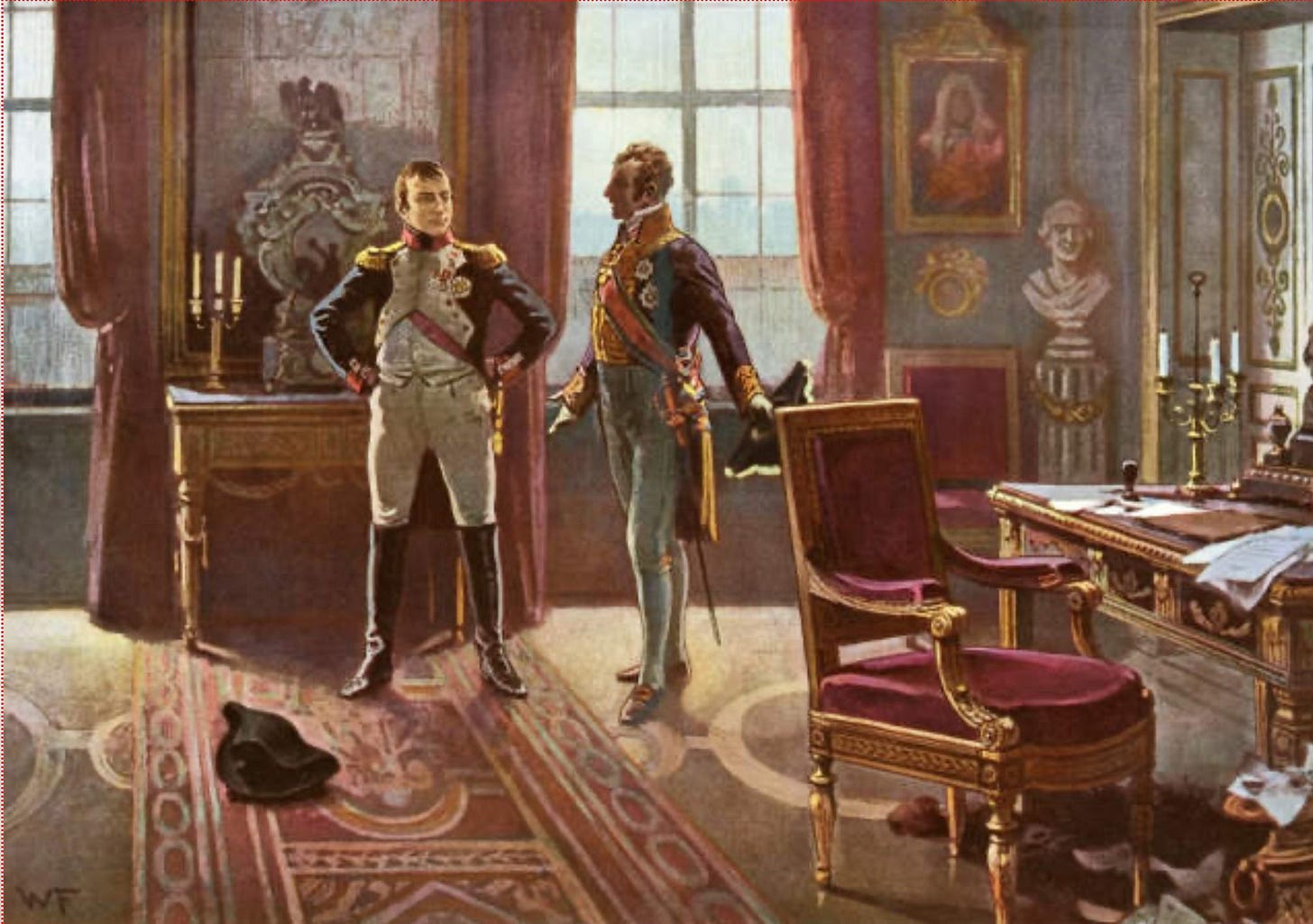Strategy doesn't stop at the border
No one lives in a vacuum, prevailing at home means shaping events abroad.
“Politics is the science of the vital interests of states. Since, however, an isolated state no longer exists . . . we must always view the society of nations as the essential condition of the present world.“
Klemens von Metternich
The myth of sovereignty tells us that nations operate independently of each others. However, nations do not think in silos. Even if your goal is to preserve the autonomy of your nation as much as possible, you still need to pay attention to other countries' politics. That’s not a product of social media or globalization, this has been a logic operating in the world for centuries.
In an era of Revolution, Prince Klemens von Metternich understood this. The Austrian diplomat and statesman who shaped European politics throughout the 19th century operated from one foundational belief: there is no national policy distinct from international policy.
I have long admired Metternich since I was in college. I have read some of his works and also Henry Kissinger's seminal book, A World Restored. Recently, I read Wolfram Siemann's excellent biography of Metternich and I have been quite obsessed with the character and the similitudes between the time he lived and ours.
Metternich’s strategy: geopolitics as domestic policy
After Napoleon's defeat, Metternich was the architect of the Concert of Europe. He created a system of alliances and diplomatic protocols designed specifically to suppress revolutionary movements across the continent.
Metternich understood that to hold Vienna, you had to watch Paris. Even if his loyalty and main concern was towards protecting Austria's internal stability, he aimed to prevent any revolutionary current from disrupting the entire continental order.
Metternich's genius was to treat geopolitics as part of domestic politics. He didn't see Austria in a vacuum, but as part of a fragile balance where movements, ideas, and unrest were shared currency.
A successful revolution anywhere in Europe, threatened the order Metternich sought to preserve. For example, the nationalist revolutions of 1830 and 1848 perfectly show how movements centered on national identity and often hostile to one another could nevertheless fuel each other without any formal coordination.
When Metternich advocated to suppres a revolution in Naples, France or Spain, he was protecting the monarchy in Austria.
Despite Metternich's efforts, revolutions eventually spread throughout the continent. Defeating Napoleon wasn’t enough. However, revolutions weren’t contagious because of the diffusion of revolutionary ideas but by the existence of widespread grievances that compeled the people to rebel against established orders.
Yet the system Metternich built delayed their progress and provided time for alternative paths to emerge—paths more aligned with the aristocratic Enlightenment that had dominated 18th century Europe and which Metternich himself represented.
The lesson for today: no one lives in a vacuum, prevailing at home means shaping events abroad.
A transnational struggle for power
Today, our world is vastly more interconnected than Metternich could have imagined. Information and ideas travel instantly across social media in a predominantly English-speaking global cultural sphere, increasingly capable of transcending language barriers.
Since 2016, the logic of interconnected political systems has intensified with the confrontation between the populist right and the coalition of liberal centrist and leftist parties of the establishment.
The forces of the right are highly interconnected in a mostly spontaneous way through social media, sharing narratives, memes, and common themes.
President Donald Trump's victory in 2024 has provided momentum for analogous movements across the globe. However, Trump's administration has yet to develop a coherent strategy for supporting sympathetic parties abroad. And no, Elon Musk's endorsements before an election neither have meaningful impact nor constitute a diplomatic strategy.
Consider how the recent wave of tariffs targeted not only US partners but also governments friendly to Trump's administration, which can be easily mobilized by establishment forces against domestic populist parties.
Populism’s strategic blind spot
MAGA, as a nationalist movement, has an inherent America-centric attitude. The drive to dismantle the liberal institutional order—which indeed reinforces the status quo—has somehow led Trump to place on a secondary plane the fact that opposing "globalism" requires presenting a global path of action.
This could be a costly mistake in coming years. Since the populist wave began in the 2010s, establishment forces have appeared more conscious of Metternich's lessons than their populist counterparts.
They have demonstrated greater coordination in their responses to populism on both sides of the Atlantic. The European establishment have shown willingness to use all available means to counter populist forces despite their continuous growth. Lately has become fashionable to push the narrative that all the problems of Europe began on November 5th 2024.
There is a limit, of course, to how long voters can accept blaming all their problems are caused by a president in another country rather than the domestic political parties that have been ruling for decades.
As long as structural problems stay unaddressed even if specific populist governments fail, the conditions generating populist insurgencies in America and Europe would remain unchanged.
But a coordinated external response can limit the consolidation of populist forces in power, even remove them from office or prevent their reelection—just as Metternich managed to contain revolution in Europe for almost twenty years.
The truth is that elections are not national affairs anymore. In an interconnected world, no political movement is truly isolated. Metternich's lesson is thus today more valid than ever: your politics doesn’t stop at your border.
Those who recognize this reality—and act accordingly—will be better positioned to navigate the turbulent currents of political change, whether they seek to accelerate or restrain them.


